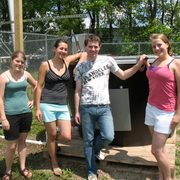-
People often assume that composting is this impactless way of returning unlimited amounts of food waste to the earth and restarting the cycle — or that it’s impossible to produce too much waste as long as it’s compostable. This is not accurate. Facilities like this one can handle large volumes of waste, but it is currently running at capacity. Compost is a great option, but any kind of waste management is going to have an impact on the ecosystem.
-
Those dedicated SOPEers are at it again. After convincing the dining hall to use silverware made of corn, revitalizing the green roof, and founding the Sustainability Revolving Fund, SOPE has installed a new eco-friendly project on campus.
-
ITS recycles more than 10 tons of computer equipment
(Via Carleton News)
With so much focus on recycling items like paper, aluminum, and plastics, we often fail to consider the end-use fate of more complicated technology like computer equipment. Computers and other electronics often contain materials that are harmful to the environment if allowed to leach out through improper disposal of the equipment. Combine that fact with the rate at which this type of technology becomes obsolete and the potential for serious environmental damage arises. To help prevent such improper disposal, Carleton’s Informational Technology Services (ITS) department recently organized an event to help the college and the Northfield community find a home for obsolete computer equipment.
In coordination with Material Processing Corporation (MPC), Carleton gathered 20,482 lbs. of used computer equipment, which will be processed and recycled through MPC’s facility in Eagan. According to Sue Traxler, the organizer of the event, plans are tentatively being made for another recycling day in the Spring. To read the whole story, click here.
Categories
- Building and Planning
- Carleton's Wind Turbines
- Climate Change
- Conferences
- Cowling Arboretum
- Ecosystem Management
- Emissions and Offsets
- Energy Sources & Uses
- Environmental Justice
- Events
- Food
- Higher Education
- International News
- National News
- News
- STA Program
- Student Life
- Student Projects
- Sustainability
- Sustainable Planning & Development
- Transportation
- Waste
